Top 10 Body Gestures Considered Offensive in Other Countries
Language can be an odd topic when it comes to other countries, especially when it even comes to nonverbal communication. A sign that may look harmless (such as the peace sign) in America, can be considered very offensive in other countries such as the U.K. On the other hand, you may not know that the OK sign can have sexual references on Latin countries such as Brazil. This is why knowing the cultural differences and manners of a country is important - as you may accidentally offend someone if you unintentionally give them the wrong sign when communicating with someone. This list gives you a background of what signs you should not use on other countries.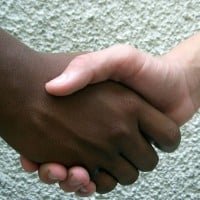 The hand shake is a widely used greeting in non-verbal language (usually done with the right hand) - used to shown expression of acceptance, agreement, and sportsmanship. However in many countries such as Ethiopia and especially the United States, using the left hand is considered an unacceptable gesture since it symbolizes bad manners. However some countries like India generally do not prefer to use handshakes and instead use other gestures instead (such as the Namaste)
The hand shake is a widely used greeting in non-verbal language (usually done with the right hand) - used to shown expression of acceptance, agreement, and sportsmanship. However in many countries such as Ethiopia and especially the United States, using the left hand is considered an unacceptable gesture since it symbolizes bad manners. However some countries like India generally do not prefer to use handshakes and instead use other gestures instead (such as the Namaste) To be fair I'm glad this is getting obsolete. It's the perfect way to transmit germs. The bow used in East Asia is far better.
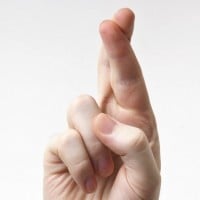 Crossed fingers usually represent the symbol of luck - and is often associated with Christianity; it is a widely accepted sign all over the world. However in Vietnam, crossing your fingers is considered an insult since it represents the female genitals. You could call this the Eastern variant of the middle finger.
Crossed fingers usually represent the symbol of luck - and is often associated with Christianity; it is a widely accepted sign all over the world. However in Vietnam, crossing your fingers is considered an insult since it represents the female genitals. You could call this the Eastern variant of the middle finger. I will never be able to look at these the same way again...
Since when was that a Christian thing.
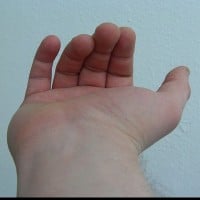 Also known as the beckoning sign - used to call someone to approach you. In other words, it is a saying of "come here" in body language. However in Japan and in the Philippines, this is considered offensive as it is only reserved for pets - especially for dogs. What's worse, doing this in the Philippines is a naive way to get you arrested.
Also known as the beckoning sign - used to call someone to approach you. In other words, it is a saying of "come here" in body language. However in Japan and in the Philippines, this is considered offensive as it is only reserved for pets - especially for dogs. What's worse, doing this in the Philippines is a naive way to get you arrested. I have accidentally done this once (and indirectly) when I was trying to call out my dog to approach me, when in my sight there was someone behind my dog on the distance walking towards me. It didn't exactly resemble the sign as shown by the image but it was almost spot on. Strangely I was lucky to not get called out for this.
I did this in the Philippines and nobody got offended!
 The thumbs up is widely recognized as a positive sign in many countries. However, this isn't the case for all countries depending on culture and context. In some commonwealth and African countries - as well as some parts of Asia, the thumbs up sign is considered a sign of hate and an insult.
The thumbs up is widely recognized as a positive sign in many countries. However, this isn't the case for all countries depending on culture and context. In some commonwealth and African countries - as well as some parts of Asia, the thumbs up sign is considered a sign of hate and an insult. It's surprising that it's a insult in Italy... I'll have to remember whenever I go there
Dang. I like my thumbs being up though.
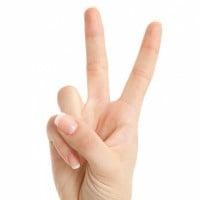 The V-Sign generally represents peace on all over the world; it is also used to represent victory after war. Ironically it is considered offensive in countries such as the United Kingdom, Australia, Ireland, and New Zealand since it represents the opposite of peace, or contempt when done the opposite way around. So if you are going to wish peace on people within these countries, things are not going to go really peaceful for you...
The V-Sign generally represents peace on all over the world; it is also used to represent victory after war. Ironically it is considered offensive in countries such as the United Kingdom, Australia, Ireland, and New Zealand since it represents the opposite of peace, or contempt when done the opposite way around. So if you are going to wish peace on people within these countries, things are not going to go really peaceful for you... I'm Australian, but I never knew that this was offensive.
Believe it or not, it means up your bum.
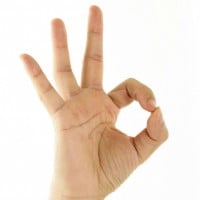 This is a body language saying of "Are you okay?" However this sign can be more complicated and "not OK" to use when it comes to other cultures and contexts - such as Turkey and Brazil, this sign is a showing of "You are an ass" since it represents the anus; it can be also used as a sign of showing homophobia. If you find yourself traveling to any countries belonging in Latin America, best to avoid this sign.
This is a body language saying of "Are you okay?" However this sign can be more complicated and "not OK" to use when it comes to other cultures and contexts - such as Turkey and Brazil, this sign is a showing of "You are an ass" since it represents the anus; it can be also used as a sign of showing homophobia. If you find yourself traveling to any countries belonging in Latin America, best to avoid this sign. The ok sign is literally my go to.
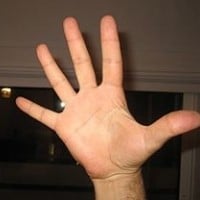 Also called the Moutza. Usually this is a sign that represents "stop". However, this is considered offensive in Greece when shown towards their face. The reason why this sign is considered offensive is because it was used as a curse dated back in older times. People would smudge cinder onto parading criminals' faces riding on donkeys as an act of humiliation, thus making this sign offensive. In Mexico, this can be considered a friendly greeting when waving the hand.
Also called the Moutza. Usually this is a sign that represents "stop". However, this is considered offensive in Greece when shown towards their face. The reason why this sign is considered offensive is because it was used as a curse dated back in older times. People would smudge cinder onto parading criminals' faces riding on donkeys as an act of humiliation, thus making this sign offensive. In Mexico, this can be considered a friendly greeting when waving the hand.Why would you want to touch someone's head?
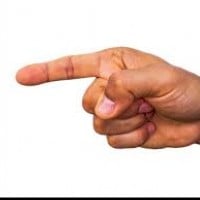 Pointing with your index finger to indicate a direction might be normal in most countries, but this isn't the case for Malaysia as it can be considered a rude gesture. To do so correctly, you must point a direction with your palm open.
Pointing with your index finger to indicate a direction might be normal in most countries, but this isn't the case for Malaysia as it can be considered a rude gesture. To do so correctly, you must point a direction with your palm open.
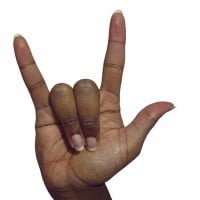 This sign is especially used by metal and rock fans to express themselves. Plenty of Latin countries find this offensive since it represents cuckolds (meaning a man married to a wife who's considered unfaithful - one who commits adultery).
This sign is especially used by metal and rock fans to express themselves. Plenty of Latin countries find this offensive since it represents cuckolds (meaning a man married to a wife who's considered unfaithful - one who commits adultery).